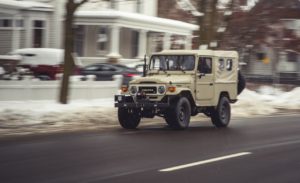
Keeping up with the increasingly powerful and computer-assisted automobile is serious work. It can dazzle our senses one minute and numb them the next. We’re not complaining; we just sometimes need to unwind with a hot soak in frivolity. Such as driving a custom 1981 Toyota Land Cruiser that costs as much as a new Lamborghini Huracán.
You read that correctly: The restored and lightly modernized FJ43 rig you see here—the top-spec Signature model from the Miami, Florida–based FJ Company—stickers for $210,900 with a handful of options. A rational purchase it is not. But iconic vehicles can captivate their fan base to the point of obsession, and the classic FJ Land Cruiser, most notably those built from 1955 to 1984, is nothing less than an off-road folk hero.
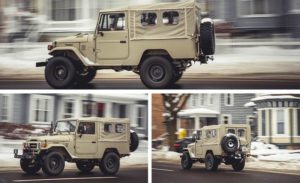
Old Becomes New
The FJ Company focuses primarily on rebuilds of the FJ43 and the even-shorter-wheelbase FJ40 Land Cruisers but also does work on the earlier 20-series and later 60-series models. Starting this year, the firm intends to sell up to 24 Signature-type trucks, for which our Matte Dune Beige test example is an early prototype. Think of it as a trail-ready alternative to a Singer-built Porsche 911, albeit with greater adherence to the original vehicle’s formula and at a somewhat less ridiculous price. We’ve compiled a visual tour of the roughly 3500-labor-hour resurrection process. All examples are built to order, with customizations starting with an impressively detailed and robust online configurator.
All of the company’s creations, from turn-key vehicles to contracted customer jobs, go through the same body-off restoration process at a 75,000-square-foot production facility in Bogotá, Colombia. The FJ43’s build quality and details are meticulously rendered and restored—such as the super-cool vintage Toyota badges that wrap around one of the rear corners—and its boxy, old-school charm is off the charts. While $200K buys you a 21st-century powertrain and a host of other updates not available on the company’s less expensive versions, make no mistake: This is an authentic, steel-bodied FJ Land Cruiser that, despite its enhancements, still drives with the woolly disconnectedness of an ox cart.
The Signature is underpinned by custom live axles front and rear with 4.10:1 gears and rides on 17-inch steel wheels wrapped with meaty 285/70R-17 BFGoodrich Mud-Terrain T/A KM2 tires. Beefy Old Man Emu leaf springs and new-age Fox dampers at all four corners are good for about 2.5 inches of suspension lift above stock and have the compliance of a bridge girder; loading the FJ with a half-dozen adults—the four in back sit on two longitudinally oriented fold-up benches—greatly improves this off-roader’s normally jarring ride quality.
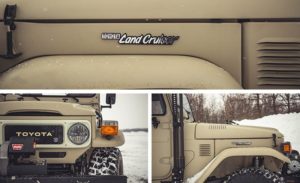
Safety equipment includes six seatbelts as well as four-wheel disc brakes from a current Toyota 4Runner (13.3-inch rotors in front, 12.3-inchers in back), which are adequately powerful but feel wooden at the pedal. Our prototype lacked ABS assistance, but production models will have it. A carefully modulated panic stop from 70 mph required 209 feet as the off-road rubber squirmed and howled on the edge of lockup.
Caning a Conestoga Wagon
We never tested an FJ43 back in the day, but the FJ Company says the Signature’s updated hydraulically assisted recirculating-ball steering is far more precise than the original system. Which is a bit scary considering that the huge, thin-rimmed wheel has the feel and exactitude of a farm tractor’s and takes a lazy 4.1 turns to spin from lock to lock. Standing 81.5 inches tall with 57.3 percent of its porky 4726 pounds resting on the back wheels added to this FJ43’s waywardness when changing direction. (For reference, that curb weight is about 250 pounds heavier than a four-door 2018 Jeep Wrangler JL. As Jeep has done for its latest hard-core Rubicon models, switching to BFG’s All-Terrain T/A KO2 tires likely would improve the FJ’s road manners.)
Unlike the company’s $85,000 Classic and $120,000 Sport models, the big-buck Signature eschews the FJ Land Cruiser’s original inline-four and -six engines for a newer Toyota 4.0-liter V-6 with variable intake-valve timing, which is good for 231 horsepower and 266 lb-ft of torque in this application. Clutch takeup on the standard five-speed manual, the only transmission choice, is smooth and progressive, but the shift lever moves with long, deliberate throws and chunky engagement. The truck’s wide, custom pedals, which are tightly spaced and offset to the left in the footwell, also take some acclimating to. The other lever sticking out of the tunnel controls the low-range four-wheel-drive transfer case, but you still have to get out and manually engage the locking front wheel hubs for 4×4 action.
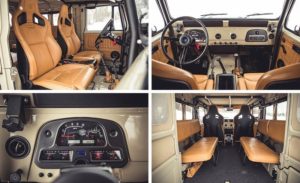
The low-revving 4.0 is all about torque (the fuel cutoff is at just 5500 rpm) and makes more than enough grunt for the FJ’s ancient steel ladder chassis. Hard launches are greeted with a squawk from the rear tires and a 92-decibel din at full throttle. (We avoided a more brutal four-wheel-drive start, as well as performing skidpad testing, out of mechanical sympathy.) Working through the gears, we saw 60 mph arrive in a respectable 8.5 seconds and the quarter-mile pass in 16.5 at 81 mph, making the Signature about as quick as a modern subcompact car.
While it’s possible to brush 100 mph with a tailwind, the violent airflow around the covered-wagon body is a reminder that old FJs are best enjoyed at a leisurely pace. Employed as a daily driver, the FJ43 averaged just 12 mpg with us; the mostly uninsulated cabin resonates with a cacophonous 87 decibels of noise at 70 mph; and lofty step-in heights make for less than graceful ingress and egress.
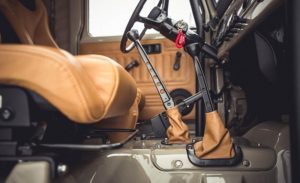 Making a Statement
Making a Statement
So, the FJ43 Signature isn’t very good to drive in the conventional sense. But that’s far beside the point for affluent shoppers with an FJ fetish and surely several other newer vehicles in the garage. If you want to stand out among a parking lot full of other $200K SUVs, the old-school Signature definitely does the trick. The FJ43 drew smiles and stares wherever it went, and its few modern conveniences add some worthwhile novelty to its entertainment. The FJ Company also is a full-service operation, with showrooms in Miami, Dallas, and Aspen, Colorado. All three locations can perform repairs under the included one-year warranty, and technicians will even do house calls, which was the case when our prototype’s radiator sprung a leak and needed to be replaced mid-test.
We would have enjoyed our stint even more, but our frigid midwinter drive revealed that the Signature is to Alpine transportation as Crocs are to snowshoes. Not only did the cold preclude us from rolling up the leading edge and the rear side panels of the standard canvas soft top (a hardtop is $5000 extra), it also exposed the tent’s many gaps that let air into the rustic cabin, as well as the ineffectiveness of the noisy Vintage Air HVAC system. Bundle up if you plan on taking your friends to the slopes. At least the supportive front Recaros and the rear bench seats are heated.
Additional standard highlights include a trailer hitch, a stainless-steel exhaust system, blindingly effective LED headlights, an Apple iPad Mini and JL Audio stereo embedded in the center console, a retro-looking gauge cluster with digital secondary readouts, dual 12-volt batteries, custom-made door mirrors and various handles and levers, and a backup camera that displays in the rearview mirror.
Although the optional ARB locking differentials ($3500), roll cage ($2000), and a heavy-duty Warn winch ($3500) mounted on a custom front bumper were notable extras on our example, we doubt that a truck this nice will ever see serious trail work. That may be a shame for some of the FJ faithful, yet the Signature fulfills its mission as a grand totem of adventuring coolness by simply tooling around town. Sure, it’s expensive, but you can hardly put a price on time travel.
Specifications >
VEHICLE TYPE: front-engine, rear/4-wheel-drive, 6-passenger, 3-door convertible
PRICE AS TESTED: $210,900 (base price: $200,000)
ENGINE TYPE: DOHC 24-valve V-6, aluminum block and heads, port fuel injection
Displacement: 241 cu in, 3956 cc
Power: 231 hp @ 5200 rpm
Torque: 266 lb-ft @ 3800 rpm
TRANSMISSION: 5-speed manual
DIMENSIONS:
Wheelbase: 95.7 in
Length: 165.9 in
Width: 65.6 in Height: 81.5 in
Curb weight: 4726 lb
C/D TEST RESULTS:
Zero to 60 mph: 8.5 sec
Zero to 90 mph: 25.2 sec
Rolling start, 5–60 mph: 8.9 sec
Top gear, 30–50 mph: 13.8 sec
Top gear, 50–70 mph: 19.4 sec
Standing ¼-mile: 16.5 sec @ 81 mph
Top speed (drag limited, mfr’s claim): 106 mph
Braking, 70–0 mph: 209 ft
C/D FUEL ECONOMY:
Observed: 12 mpg


